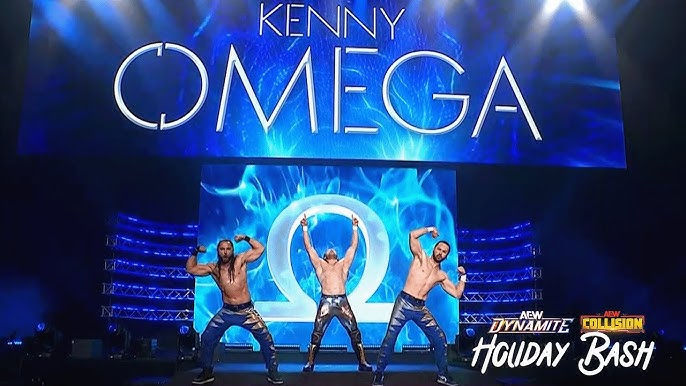Adam Page Shows How To Wrestle With Anxious Masculinity
- Greyson Peltier
- Oct 14, 2022
- 5 min read
Adam Page shows us how to turn “anxious masculinity” into personal and social victory, and solve a key challenge of our current political state.

Photo: All Elite Wrestling
Note: Greyson Peltier’s columns feature social analysis and discuss the fight to Change The World, through the lens of kayfabe. Strong language may be used and concepts presented may not represent conventional practices.
In The Washington Post, Paul Waldman recently wrote about “anxious masculinity” being a key influence in how the next presidential race will play out, a phenomenon of men who feel like their sense of being a man is threatened by “wokeness.” Men feel like they have lost their place, like their lives are being eroded around them, are turning to strongman politicians, which is a known component of fascism. Tucker Carlson goes on national TV as the proper, top cable news show host in the United States, but also features a cowboy-like aesthetic to the more “personal” side of his programming called “Tucker Carlson Today,” and talks about his documentary “The End of Men” on how men are being made weaker by society and being vilified by progressives and “radical leftists.” Potential methods to increase testosterone like diet, lifting weights, and doing challenging things are presented as solutions. Alongside this discussion, his show also pushes opposing immigrants’ rights, womens’ rights, “criminals” as a dog-whistle for people of color, and solving the “laziness” implicitly produced by welfare as systemic counterparts in this world of alternative facts. And the erasure of masculinity is too a serious, existential crisis where somehow men will no longer be able to reproduce and all the while politicians just don’t care, they claim.
Wednesday night on AEW Dynamite, in his promo against current AEW World Champion Jon Moxley ahead of their world title match, former World Champion “Anxious Millennial Cowboy'' Hangman Adam Page shared his own anxieties and doubts about his masculinity and strength, feeling invalidated by being referred to as a “kid” by Moxley, in spite of a litany of achievements. He expressed his frustration about his efforts and good nature not yielding the results he worked for, stating that “for all that I did, I’m left with nothing,” a common theme Millennials have experienced in the workplace with gaps in wages and living through repeated economic crises. He lamented that his “friends…have disappeared,” and about how he lost the thing that mattered most to him, the AEW World Championship, because he “hesitated.” Likewise, Millennials in particular feel left behind economically and socially, isolated, and angry, and for good reason. However, he showed the correct way to address this anxiety about masculinity, setting a model as he consistently has done. His presentation was not weak, cowering, or emasculated; Page starts by sharply demanding that he be confronted “straight to (his) face” by Moxley with any criticisms he had of him, while he leads into boldly asserting that he is, in fact a “man,” not a kid.
Page was not posturing and putting on a front that he is better or stronger than everyone else, a person without challenges or struggles, but shows and embraces vulnerability enough to say that he was “anxious,” “depressed,” and “the medicine is not working,” which can is relatable to the feeling that many men who wind up being “radicalized” have that the conventional paradigm of mental health is failing them. Page sets an example not by imposing domination over the opposite sex or blaming them, not by blaming political scapegoats, not with fascism, but asserting his manhood at full force with actions validating true family values, being a good husband and father, and his timeless imperative of Cowboy Shit: challenging those who have it all until you find your peace. This, among many other aspects of the Hangman narrative, will get downtrodden young men to listen for long enough to change their path toward the fight for systemic change that will truly benefit them as members of the working class while also supporting disadvantaged populations.
“For all that I did, I’m left with nothing, so I’m not the same, I’m angry, I’m frustrated…I’ve been beaten in that same face over and over, but I keep coming back because I am a man.” - Adam Page
Page, a progressive athlete-activist known for his positions on racial inclusion, LGBTQ rights, workers’ rights, and climate change, made no qualms about exclaiming that he is a man and is tough enough to fight. This kind of confidence and intensity directed in a positive manner is what progressives should be aiming for, which both helps young men find fulfillment while still pushing for social change and also counters the claims of right wing grifters that progressive ideology is akin to weakness or the erasure of masculinity. Getting in the ring and fighting fairly for what is truly yours is both the higher ground and the more effective choice than blaming oppressed groups or a nonsensical conspiracy. Even with everything he felt and went through, Page proclaims “I’m still here because I am a man.” The individual pursuit of excellence should accompany joining with a collective group of solidarity like Hangman has had with the Dark Order, a group that seeks empowerment but also engages in unfiltered humor in a fun, non-hateful manner. Real-world groups, like a set of those in the online fitness community who identify as the Swoletariat and a powerlifting gym focused on LGBTQ inclusion, are starting to create positive, progressive masculinity. The path forward for progressive ideas must include the righteous representation of strength combined with openness and vulnerability that helps men feel validated in their challenges, and an interest in helping men become fulfilled and feel like champions if we are to gain the interest and votes of men who feel they have lost it all. Further, embracing “imperfect” masculinity with acceptance of each man’s unique expressions and challenges can be a decisive factor in choosing progressive communities over more conservative ones.
As those cleverly made pieces of propaganda, which we call memes, for the dog-whistle of “traditionalism” say “which way, modern man?” I choose the way of a champion who with an unimpeachable background of achieving feats these influencers can only dream of, the Cowboy Shit way.
Greyson Peltier is the host of The Fixerpunk Podcast and a communications consultant specializing in social impact and political advocacy. He has been on both sides of the political aisle and has worked for multiple organizations. Peltier is a graduate of the University of Southern California with a BA in Political Science and has been featured by media outlets like Vice, ESPN Radio KLAA, USA Radio Network, and Street Fight Radio.
This content is for entertainment and general informational purposes only. The accuracy of the information contained herein is not warranted or guaranteed. The viewer should not rely solely upon such and consult a competent professional before deciding to follow any course of action.
.png)









Comments